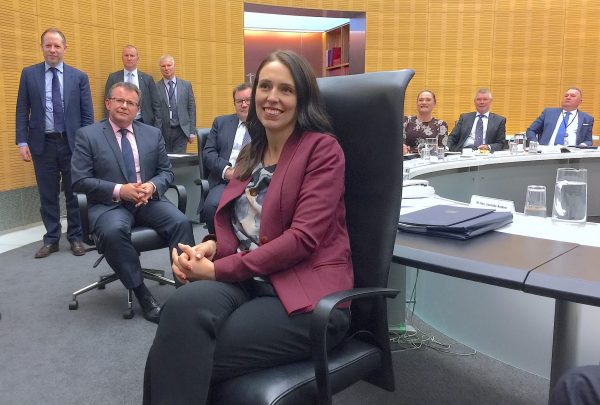This remarkable political experiment has not been without its problems. For example, business confidence has taken a hit. But while the new team has been unable to enjoy the very positive relationship with the private sector that was a hallmark of the John Key–Bill English era, economic growth has remained healthy. And while some of the spending priorities that seek to redistribute wealth and opportunity have come in for criticism, Finance Minister Grant Robertson has insisted on retaining a surplus. This means that some sectors, including teachers, have not been getting quite what they have been bargaining for.
The same can’t be said for New Zealand First’s leading ministers and their favoured projects. Deputy Prime Minister and Foreign Minister Peters is overseeing a big jump in the foreign affairs budget, much of which will be directed to aid spending in the South Pacific. His colleague Shane Jones has a war-chest to disburse around the country in his Regional Economic Development portfolio. And Defence Minister Ron Mark has secured Cabinet support for the procurement of new P8 Poseidon maritime surveillance and patrol aircraft, which will constitute New Zealand’s largest capability expenditure since the ANZAC frigates.
That New Zealand First — currently polling around the 5 per cent threshold under New Zealand’s Mixed Member proportional voting system — were handed both the foreign affairs and defence portfolios has given a certain robustness to New Zealand’s international policy. Ex-soldier Mark has also secured the extension of New Zealand’s missions in Iraq and Afghanistan as well as new deployment to help monitor North Korean ship transits. This year’s Strategic Defence Policy Statement contained New Zealand’s most extensive assessment to date of China’s game changing behaviour in the South China Sea. Peters’ own doubts about China’s regional intentions have seen him imply that the Prime Minister’s South Pacific policy reset is an attempt to help rebuild Western influence in New Zealand’s immediate neighbourhood.
Labour’s own voice on foreign policy has been diminished by the pre-election departures of Phil Goff and David Shearer. But as was the case with Helen Clark, Jacinda Ardern has been New Zealand’s other foreign minister. Alongside Peters’ more battle-weary approach, the Prime Minister has brought a fresh commitment to multilateralism and to international cooperation among open societies, and has helped make climate change one of her government’s principal priorities. New Zealand First’s preference for a free trade agreement (FTA) with Russia has been quietly marginalised as Ardern and Trade Minister David Parker have talked up a potential FTA with the European Union.
The last of these priorities is no accident. Europe, at least the version championed by the Merkels and Macrons of this world, is arguably the region that aligns most closely with Ardern’s progressive inclinations on foreign policy. This also means that of New Zealand’s Five Eyes partners, Justin Trudeau’s Canada has the most similar philosophy. Not closest partner Australia, which is entombed in the death throes of the Liberal-led coalition; not oldest partner Britain, which is ensnared by its own Brexit policy disaster; and certainly not Donald Trump’s greed-is-good variation on American foreign policy.
Given New Zealand’s attachment to the rules-based order, it would be hard to think of an American leader who has shown more antipathy to the foreign policy principles that make such good sense for Wellington than Trump. Multilateral cooperation on climate change and trade policy alone suggest a major chasm, and in her first major foreign policy address as Prime Minister, Ardern noted these as areas of difference with Washington and also as areas of commonality with Beijing.
But aside from these rhetorical flourishes, there are few indications of a real hardening of New Zealand’s position towards the Trump administration. The Defence Statement, the closest thing to a foreign policy white paper that New Zealand governments avoid publishing, struggled to find a way of talking directly about Washington’s challenge to the rules-based system. And in an end of year speech in Washington, Peters was positively glowing about the ‘cooperation and like-mindedness’ exhibited by the United States and New Zealand.
The most charitable explanation for this imbalance is that there is still hope in Wellington that the Trump era is a short-lived deviation from the American norm. Another is the view that however bad Trump’s bark may be, Xi Jinping’s bite is more worrying. In this case we can chalk up another reason why New Zealand’s relationship with Australia — which has an especially close alliance relationship with the United States — will continue to be a priority for Wellington.
But the more this means joining in on a chorus of concern about China led by the United States, the harder it will be for New Zealand to talk about itself as an independent foreign policy actor. As the New Zealand Labour Party sees that independence as its own intellectual property, it would be doubly ironic if this risk emerges under Jacinda Ardern’s watch.
Robert Ayson is Professor of Strategic Studies at Victoria University of Wellington.
This article is part of an EAF special feature series on 2018 in review and the year ahead.

